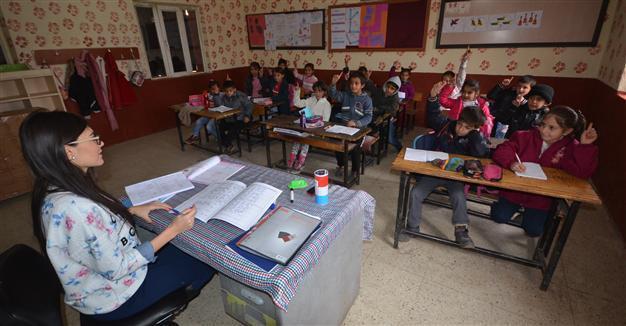Turkish teachers weigh in on new training ‘academy’
ISTANBUL – Anadolu Agency

AA Photo
As Turkey celebrates Teachers’ Day on Nov. 24, uncertainty over a proposed paid apprenticeship and “Teachers Academy” has set tongues wagging among the country’s almost 900,000 educators.Under the current system, prospective teachers are trained at a university education faculty for four years and do an apprenticeship in the final year. They later sit for a final exam to be appointed to state schools.
During their first year of employment, they are defined as “trainee” teachers by law, but not in practical terms.
However, under the new proposed scheme, a four-month paid apprenticeship may become compulsory.
Following this school-based placement, teachers will then go to an additional three-month “Teachers Academy” from June to August, “which will help them to make progress and develop their abilities,” Prime Minister Ahmet Davutoğlu said in October.
However, reactions from teachers across the country have been mixed.
“I cannot really understand the reason for such an academy,” said Alime Atasagun, 26, who has been teaching literature in a state high school in Istanbul for three years.
She is opposed to any extra training programs for teachers.
“A graduate of an education faculty has already proven that he or she is qualified to teach following four years’ compulsory education and examinations at university,” she said.
“For me, it was not a time of being guided by an experienced colleague. I was alone in the classroom teaching and trying to teach [students] better,” she said, recalling the first year of her career.
“It is the nature of teaching. You find a way of your own, which fits your students best,” she added.
With the new proposals, however, each newly appointed teacher will be accompanied by an experienced member of staff, who has been serving for at least five years, Education Minister Nabi Avcı announced previously.
For four months, they will attend various classes three days a week, will spend a day learning administrative tasks from school principals and will attend provincial directorates of national education, Avcı said.
This overlap between training and starting work has not been met with universal approval. “I do not think it is sensible to urge the graduates to do another apprenticeship at the school where they will be working as real teachers,” Atasagun said.
She said it would “give students a sense that the ‘new teacher’ is not qualified yet, and cannot teach properly.”
However, others are more supportive of the new proposals. Ekrem, 52, who declined to give his surname, is a head teacher in a state high school. He believes the additional training is valid. “The practice will be so beneficial,” he said.
“It is such a good idea that the trainee teacher will be guided by an experienced one and be paid at the same time,” he added.
However, he is not sure what kind of academy the four-month training period will be followed by.
Some teachers’ unions are also uncertain about the proposed changes.
“It is not clear in which way the project will be different from the already-existing in-service training. Here is the main concern: Teachers are worried that it may turn into a method of elimination,” said Latif Selvi, vice president of Eğitim Bir Sen education unions.
“All of them have already graduated from a university having passed their examinations and attained their qualification [...] the academy should be to develop teachers, not to eliminate them,” Selvi said.
The Teachers’ Academy would be directly related to the 30,000 candidates waiting to be appointed to state schools in February 2016.
One of these candidates is Rukiye Yaz, 27, who has been waiting to be appointed for two years.
“I find it quite useful that you would be guided by an experienced teacher,” she said, adding, “You would not find yourself suddenly in the system.”
“It is a good way for new teachers to avoid getting confused over the routine school stuff such as carrying out an examination, giving a grade and so on,” she said.
Selim, 31, who worked as a primary school teacher for three years, said trainees will learn the profession “when they really start doing it.”
He said the four-month training period, or practical experience gained during the last year of university, “will never be enough.”
“The one-year apprenticeship for final-year students is definitely not enough,” said 40-year-old Yusuf, an academic working in a state university. He stressed there should be much more hands-on experience.
“I do not expect the training supplied for three or four months would compensate for one’s failures during four years at university,” he added.
“For a better teaching profession, the curriculum at education faculties should be seriously handled and those who lack the ability to teach should be eliminated before they graduate,” he said.
















